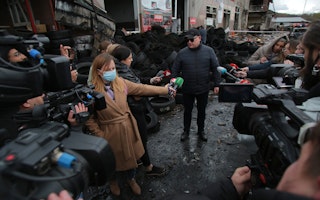Why Romanian Journalists Are Opening Bakeries
By Marius Dragomir
Hannelore Acarnulesei lives in Deva, a town of 56,000 in Transylvania, the lush, pine-forested hill country in the northwest corner of Romania. By 6 a.m. she is receiving deliveries at the patisserie she owns: croissants, tarts, crusty rolls.
Four hours later, she opens the door to customers and serves coffee and pastries until early afternoon. That’s when Acarnulesei departs her bakery and hits the streets with a reporter’s notepad, gathering quotes and stories for HunedoaraMea.ro, the online newspaper she co-owns with her husband Ovidiu Petrovai and their friend Mihai Radici.
“Because you can’t survive from online media, we bought a fornetti (a pastry shop), and then we opened two more,” Acarnulesei says. “So now we are journalist-fornettists.”
Acarnulesei started working as a journalist when she was 15, almost 20 years ago. In 2009, she lost her job at a local TV station. In an unfortunate coincidence, her husband was let go hours later from his editor-in-chief position at Hunedoreanul, a local weekly that folded the following day.
Acarnulesei gathered a group of journalists and launched a new local paper, Ziarul Hunedoreanului. “For a month, we wrote the newspaper in my mother’s home,” she says. It became the top-selling paper in town. But three years later, the head of the county hall pressured her to sell the publication to him. She did—and he turned it into a party sheet for political propaganda.
That’s when Acarnulesei decided to establish HunedoaraMea.ro, the operation of which she funds with the money she earns from selling cakes and pies.
Acarnulesei’s story is typical these days. Romanian local journalists are struggling to survive and maintain their independence in an increasingly tough environment. Most local media are now controlled or financed by municipalities or political groups, making them susceptible to the sorts of pressures and coercion that make objective reporting difficult.
For journalists who want to report the unbiased truth, establishing their own publication is often the only option.
The problem is longstanding, but it started getting worse in the early 2000s, when it became common in Romania for politicians-cum-business-owners to buy media outlets, especially local ones. This is still standard practice, according to a 2013 study on local Romanian journalism conducted by Ioana Avadani, the director of the Center for Independent Journalism in Bucharest. These politicians often fund these outlets with money from municipalities, which allows them to exert influence over what gets reported by manipulating their advertising spend.
ActiveWatch, a prominent Romanian advocacy group for freedom of expression, reported in a 2014 study that public officials often force the journalists who work at their TV stations to investigate individuals and companies that have links to the official’s political rivals; the officials then use that information for blackmail or other nefarious purposes. Television shows are often so politicized that “at a certain point, you cannot tell who the host and the guest are,” a journalist from Brasov, a city in central Romania, recently told ActiveWatch.
Increasingly, politicians and local governments don’t even try to hide their manipulation of the media. “Usually, if you want to be a real politician, you will get yourself a TV station,” Sebastian Grapa, a spokesperson with the National Liberal Party (PNL) in Brasov, told ActiveWatch. An editor from an online newspaper in Galati, in eastern Romania, said that politicians “see mass media as a sort of toilet paper they can use in political campaigns, then throw away and flush down the toilet.”
The poor financial standing of local journalists often prevents them from criticizing the authorities. “It is hard to ask a journalist who earns $400 a month to jump at a county council president’s throat,” a journalist from Resita, in western Romania, told ActiveWatch.
Faced with all these hurdles, many local journalists leave the profession. Some build their own space online. Last year, Romanians started almost 67,000 blogs, a tenth of them updated at least weekly. But their impact is limited, and such blogs rarely make money.
Romanian media NGOs argue that a strong union is needed to fight for local media and their journalists. This union could advocate for fair and transparent mechanisms to allocate public funding to local media, among other things. ActiveWatch, for instance, advised local television stations to join forces to sell advertising in bulk in order to become financially sustainable.
Many have been cheered by the November elections, which saw Klaus Iohannis take the presidency. Iohannis has a record of clamping down on corruption at the local level.
“Before the elections, I would have told you that local media were completely stuck,” Acarnulesei says. “But now I have some hope. I hope no public money will go to political party–controlled newspapers and television stations. I hope these newspapers and television stations will die.”
Until August 2016, Marius Dragomir was senior manager and publications editor with the Open Society Program on Independent Journalism.


